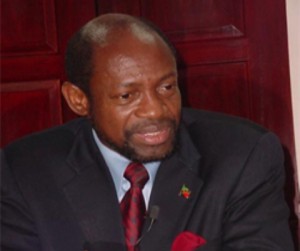VIEWPOINT by Xenophon – The Development Challenge

Small island states face a particularly frustrating development challenge. No matter how tiny a country may be, its people are caught up in what economists of the Sixties and Seventies used to call “The Revolution of Rising Expectations”. This revolution has not ended – if anything, it has grown more demanding, as young people in particular reach for the consumption patterns and the lifestyles that the developed world flaunts before their envying eyes.
The development challenge is more demanding for the governments of Caribbean states than most. Even before World War II, people from the British Empire possessions in these parts have migrated to the United States and elsewhere, as they sought opportunities denied them by the poverty and the simple mono-crop economies that defined the region. Virtual wage slavery in the sugar fields, and unrewarding labour on tiny peasant agricultural holdings, did not offer the average colonial British Subject much hope of escaping the endless cycle of under-development.
The mercantile economy that provided the rationale for the imperial relationship remained a reality, and the people of the sugar islands still sweated to export raw cane sugar or cotton to the Mother Country – so that they could import industrial products, among them refined “white” sugar. Island commercial sectors have always done their best to prosper in an environment where small populations meant that available markets would forever be limited. This remains true today, as the OECS and CARICOM constructs struggle to create an economic entity with the “critical mass” to spark self-sustaining growth.
In the years following the Second World War, rapid economic expansion by the triumphant United States military-industrial complex engulfed the region, turning the Caribbean Sea into a virtual American lake. The incredibly powerful Hollywood and Madison Avenue media machine brought visions of another world to the wondering eyes of children huddling in dark cinemas, and later crouched around flickering television screens. By the nineteen-sixties, the people of the region were demanding a better life than even their parents, who had benefited from the pioneering work of the labour unions that sprang up in the nineteen-thirties in response to the bitter privations of the Great Depression.

Today, well-educated young people are born into a standard of living their grandparents could never have imagined. Thanks to the commercial exploitation of near space, geo-stationary satellites now beam down hundreds of television channels into even the poorest households, “24-7”. The realities of the information age require governments to place the most modern computer tablets into the hands of youngsters who now spend hours tuned in images of luxury and splendor they believe they have a right to claim as their own.
These cultural and political imperatives require governments of tiny, under-resourced Caribbean states to be visionary, competent, and impactful. It is newsworthy, indeed, that St. Kitts-Nevis, the smallest nation in the western hemisphere, has consistently earned very high praise from that most demanding of judge of economic performance and financial management – the International Monetary Fund.
Indeed, it was just a few weeks ago that, based upon his own brave and responsible management of his own country’s debt, Prime Minister Douglas was asked by the Commonwealth to lead a Commonwealth delegation to Washington to propose new, insightful, and viable solutions to developing nations’ debt. In a region known for a long tradition of emigration, Prime Minister Douglas and his policies are giving the young people of his country lots of reasons to stay. For those who travel abroad to study, through his policies, the Prime Minister is giving them many reasons to return. The Federation of St Kitts & Nevis is not alone in its attempts to face up to the challenges of economic development – but the facts, figures, and reports show that Prime Minister Douglas and his Government have been more effective at producing results for his people than any of the Federation’s neighbors.
